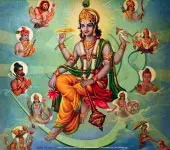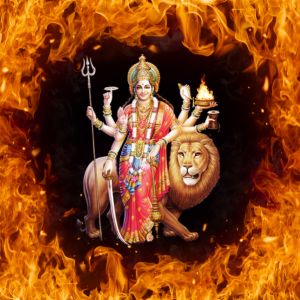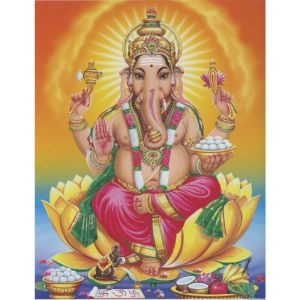Meaning Of Upasana
Transcript
(Click here to read more)
Vishnu Sahasranama, Shloka 13 - रुद्रो बहुशिरा बभ्रुः विश्वयोनिः शुचिश्रवाः। अमृतः शाश्वतः स्थाणुः वरारोहो महातपाः॥ Meaning of the 117th Divya Nama - बभ्रुः - Babhru बिभर्ति लोकानिति बभ्रुः। He supports and nourishes the worlds. अनन्तरूपो यो धत्ते पृथ्वी बभ्रु....
Transcript
(Click here)
Vishnu Sahasranama, Shloka 13 -
रुद्रो बहुशिरा बभ्रुः विश्वयोनिः शुचिश्रवाः।
अमृतः शाश्वतः स्थाणुः वरारोहो महातपाः॥
Meaning of the 117th Divya Nama - बभ्रुः - Babhru
बिभर्ति लोकानिति बभ्रुः।
He supports and nourishes the worlds.
अनन्तरूपो यो धत्ते पृथ्वी बभ्रुः स ईरितः।
He himself is Adishesha, Ananta, the support of our earth, hence he is called Babhru.
This name is connected to the previous name Bahushira.
Bahishira means Ananta.
Bahushira supports the earth upon his thousand hoods.
What is Upasana?
We say: he is an upasaka of Lord Vishnu, she is an upasaka of Devi, he is an upasaka of Ganesha.
How is upasana different from regular religious life?
In regular religious life or spiritual life, there are so many organs.
The attention is divided between so many activities.
Take the case of an office-going person.
He takes a bath.
Wears Chandana or other kinds of tilaka.
Does Sandhya Vandana,
Lights a lamp, does a small puja.
Chants some mantras or stotras.
Listens to Sahasra Nama.
On the way to the office, he takes darshana at a temple.
Does some charity.
Reads a scripture while traveling.
On weekends, he attends a satsanga.
Does one or two pilgrimages a year.
Does one or two pujas or homas at home inviting purohitas.
Does some yoga, and some meditation.
Conducts himself throughout virtuously trying not to hurt others, to be truthful, and faithful to the family.
This is the life of a regular religious person as of now.
Upasana is different.
Shankaracharya defines upsasna as -
उपासनं नाम समानप्रत्ययप्रवाहकरणम्
Upasana is a mental activity but triggered by something that exists physically, like an idol.
There is Agni upasana which Agnihotris do.
But for that, they keep Agni unextinguished at home.
And worship that Agni morning and evening.
We have mental activities and physical activities.
Mental activities, there is no limit to what all you can do mentally.
But your physical activities, you can do them only with physical objects.
If you want to cook and feed a person, then that person has to be physically present.
you won't be able to cook and feed an imaginary person.
The term pravaha in the definition of upasana means constant flow towards something.
Mental activities, with some training you can make your mind dedicated towards Bhagawan.
But then, your physical activities should not be in conflict with this.
Think about Bhagawan mentally, keep on thinking about Bhagawan mentally, but physically you are selling in the market and bargaining with your customers.
This is difficult.
Then your mental attention also gets diverted, interrupted.
So what do we do?
To make sure that your physical activities are also aligned with your thoughts, you install an idol of Bhagawan at home or a Salagrama.
Then your thoughts are centered around that.
That you have to bathe, decorate him with flowers, feed him, sing his praises to please him, chant his mantras.
So whatever thoughts that go on in your mind, they are also related to these physical activities.
Now your mental activities and physical activities, they are complementing each other.
They are not in conflict with each other.
The pravaha of your thoughts directed towards Bhagawan is ensured.
Even when you are at the office, you are thinking: on the way back I have to buy fruits for Bhagwan.
I am working only to earn money to take care of Bhagawan's puja.
To take care of his devotees who are the members of his family.
See where it is going:
Sharanagati.
This will come naturally through upasana.
Another main characteristic of upasana is samana pratyaya.
The upasya (the Devata you are worshiping) should not keep on changing.
Your Upasana - Devata should not change.
Then it is not upasana.
Then it is just puja or leading a religious life.
The Devata should be unique.
It can be Radhakrishna together in yugala swaroopa.
No problem.
But if it is Devi on Fridays and Shiva on Mondays, then it is not upasana.
It is just worship.
You can have upasana and the regular religious life parallelly.
No problem.
But upasana is the constant direction of all your mental activities towards a single Devata supported by physical activities that would complement this.
There is effort involved in this.
That is why the term karanam is there in the definition.
Recommended for you
The Vedic system of idol worship of Sri Hari
 Click here to know more..
Click here to know more..
Durga Saptashati - Chapter 1

प्रथमचरित्रस्य । ब्रह्मा ऋषिः । महाकाली देवता । गायत्री....
Click here to know more..Ganesha Pancharatnam Meaning

I offer my salutations to the remover of obstacles, adorned with modakas in hand. He is the eternal bestower of salvation, with the moon as his radian....
Click here to know more..
English Topics
Vishnu Sahasranama
Click on any topic to open
- 246 The Profound Power of Remembering Bhagavan
- 245 So Easy To Be A Devotee Of Bhagawan
- 244 Should You Always Obey Your Elders?
- 243 Story Of Alarka
- 242 A Woman Who Wanted to Kill Draupadi And Arjuna
- 241 Exploring the Teachings of Azhwar Vaishnavism
- 240 Knowledge Is Power
- 239 Chitraketu: The Story of a King Who Found Enlightenment Through Suffering
- 238 Krishna's Name Is The Most Effective Medicine In The World
- 237 How Is Krishna Worship Different From General Worship
Please wait while the audio list loads..
30
Ganapathy
Shiva
Hanuman
Devi
Vishnu Sahasranama
Mahabharatam
Practical Wisdom
Yoga Vasishta
Vedas
Rituals
Rare Topics
Devi Mahatmyam
Glory of Venkatesha
Shani Mahatmya
Story of Sri Yantra
Rudram Explained
Atharva Sheersha
Sri Suktam
Kathopanishad
Ramayana
Mystique
Mantra Shastra
Bharat Matha
Bhagavatam
Astrology
Temples
Spiritual books
Purana Stories
Festivals
Sages and Saints
